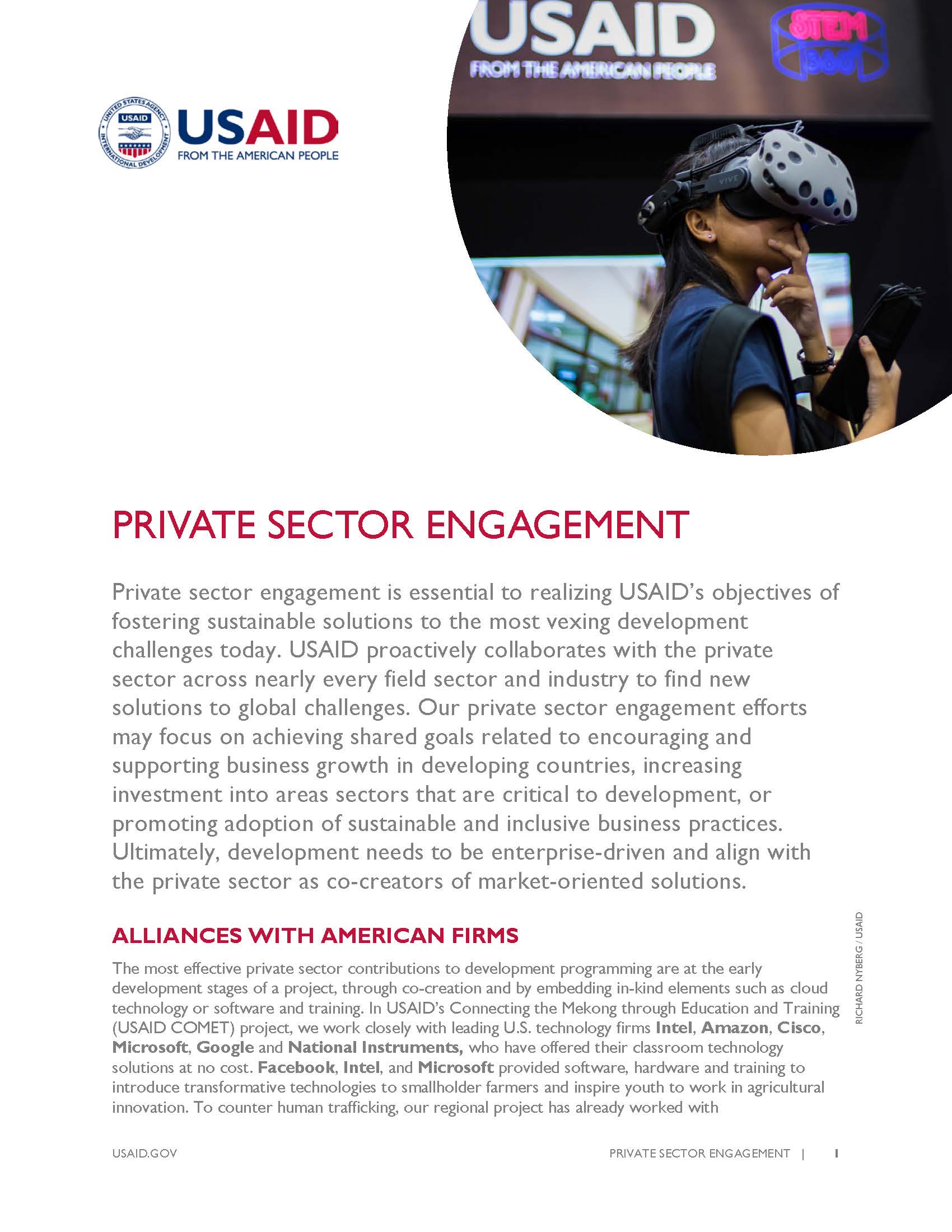Speeches Shim
Private Sector Engagement ![]() (pdf - 244k)
(pdf - 244k)
Private sector engagement is essential to realizing USAID’s objectives of fostering sustainable solutions to the most vexing development challenges today. USAID proactively collaborates with the private sector across nearly every field sector and industry to find new solutions to global challenges. Our private sector engagement efforts may focus on achieving shared goals related to encouraging and supporting business growth in developing countries, increasing investment into areas sectors that are critical to development, or promoting adoption of sustainable and inclusive business practices. Ultimately, development needs to be enterprise-driven and align with the private sector as co-creators of market-oriented solutions.
ALLIANCES WITH AMERICAN FIRMS
The most effective private sector contributions to development programming are at the early development stages of a project, through co-creation and by embedding in-kind elements such as cloud technology or software and training. In USAID’s Connecting the Mekong through Education and Training (USAID COMET) project, we work closely with leading U.S. technology firms Intel, Amazon, Cisco, Microsoft, Google and National Instruments, who have offered their classroom technology solutions at no cost. Facebook, Intel, and Microsoft provided software, hardware and training to introduce transformative technologies to smallholder farmers and inspire youth to work in agricultural innovation. To counter human trafficking, our regional project has already worked with YouTube/Google. In addition, USAID is working with the Coca-Cola Company, as well the government s of Lao PDR and Thailand, on community water resource management in Laos. In the health sector, USAID has an active partnership with Microsoft to maximize the reach of health promotion messages and works with OraSure Technologies to distribute HIV test kits from Thailand. In addition to distribute tuberculosis medication USAID has worked with Jannsen Pharma (under Johnson & Johnson) and has partnered with Elanco Animal Health to reduce the use of antibiotics to raise livestock.
TAPPING ASIA'S GROWING EXPERTISE
Beyond Bangkok, Singapore remains the single largest hub for Southeast Asia-based regional offices of U.S. and multinational companies. USAID’s commitment to increased collaboration with the private sector will generate outcomes and have lasting impact around the world. To succeed in Asia, prioritizing engagement with prospective private sector partners in Singapore and cultivating partnerships is critical, especially with their growing and sincere interest in corporate social responsibility. In our regional project USAID Green Invest Asia, which aims to reduce deforestation and reduce barriers to responsible investment, we work with Control Union, Mekong Strategic Partners and Lotus Impact. The USAID Clean Power Asia project works to encourage investment in renewable energy, and has worked with the regional Thai supermarket chain, Big C, to invest in solar panels to cover its retail facilities. In our work to build a catch documentation system and reduce illegal fishing, we have established official partnerships with British satellite firm Inmarsat, and the large seafood processing firm Thai Union (the current owner of the Chicken of the Sea brand).
Companies do not view their engagement with the public sector solely through the lens of corporate social responsibility. It is the view of companies that they should invest in partnerships with the public and non-profit sectors because it is in their long-term interest: it helps lay the foundations for new markets and creates a reservoir of goodwill from which companies can draw when working with local governments.


Comment
Make a general inquiry or suggest an improvement.